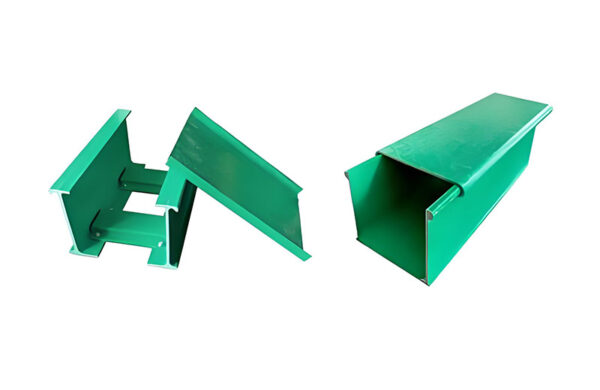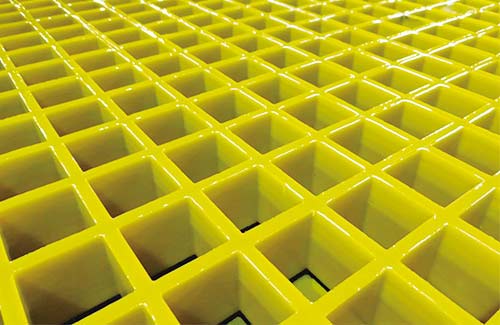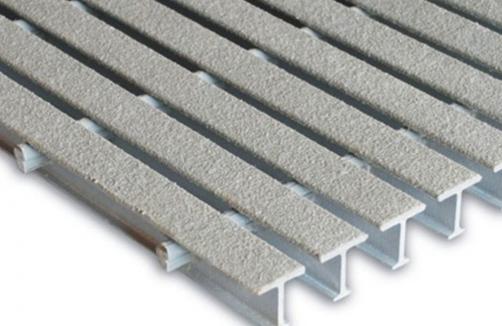Explorer les avantages des caillebotis en PRFV résistants à la corrosion pour les applications industrielles
La corrosion est un problème important dans les environnements industriels, où les matériaux sont constamment exposés à des produits chimiques agressifs, à l'humidité et à des températures extrêmes. Les matériaux traditionnels comme l'acier et le béton souffrent souvent de la corrosion, ce qui entraîne des coûts de maintenance, des risques pour la sécurité et des temps d'arrêt. Le caillebotis en polymère renforcé de fibres (PRF) s'est imposé comme une alternative supérieure, offrant une résistance exceptionnelle à la corrosion et une foule d'autres avantages. Mais qu'est-ce qui fait du caillebotis FRP le choix idéal pour les applications industrielles ? Examinons les avantages et répondons aux questions les plus fréquentes.
Qu'est-ce qu'un caillebotis en PRFV et comment fonctionne-t-il ?

Le caillebotis FRP est un matériau composite composé de fibres de verre renforcées par une résine polymère. Cette combinaison crée un matériau solide, léger et très durable qui résiste à la corrosion, à l'isolation électrique et aux conditions climatiques extrêmes. Contrairement aux matériaux traditionnels, le caillebotis FRP ne rouille pas et ne se dégrade pas avec le temps, ce qui en fait une solution rentable pour les environnements industriels.
Pourquoi choisir le caillebotis FRP plutôt que les matériaux traditionnels ?
Les matériaux traditionnels tels que l'acier et le béton sont sujets à la corrosion et nécessitent un entretien et un remplacement fréquents. Les caillebotis en PRFV, en revanche, offrent une durabilité à long terme avec un minimum d'entretien. Cela permet non seulement de réduire les coûts d'exploitation, mais aussi d'améliorer la sécurité en éliminant le risque de défaillance structurelle due à la corrosion.
Principaux avantages du caillebotis FRP résistant à la corrosion
1. Résistance exceptionnelle à la corrosion
L'une des principales raisons pour lesquelles les industries optent pour le caillebotis FRP est sa résistance inégalée à la corrosion. Qu'il soit exposé à des produits chimiques, à de l'eau salée ou à des environnements acides, le caillebotis FRP n'est pas affecté. Il est donc idéal pour les applications dans les usines chimiques, les environnements marins et les installations de traitement des eaux usées.
2. Léger et solide
Le caillebotis FRP est nettement plus léger que l'acier tout en offrant une résistance comparable. Cela réduit la charge sur les structures de soutien, ce qui facilite l'installation et la manipulation. La légèreté améliore également la sécurité en réduisant le risque d'accidents lors de l'installation et de la maintenance.
3. Isolation électrique
Le caillebotis FRP est un excellent isolant électrique, ce qui le rend approprié pour des applications à proximité d'équipements et de câbles électriques. Cette propriété permet d'éviter les courts-circuits et les risques électriques, garantissant ainsi un environnement de travail plus sûr.
4. Surface antidérapante
De nombreux environnements industriels exigent des surfaces antidérapantes pour des raisons de sécurité. Les caillebotis en PRFV peuvent être fabriqués avec une surface antidérapante, ce qui réduit le risque de glissade et de chute. Ceci est particulièrement important dans des conditions humides ou glissantes.
5. Longévité et faible entretien
Les caillebotis en PRFV ont une longue durée de vie et nécessitent un entretien minimal par rapport aux matériaux traditionnels. Cela se traduit par une réduction des coûts à long terme et une augmentation de la productivité, car il n'est pas nécessaire de procéder à des réparations ou à des remplacements fréquents.
Répondre aux questions les plus fréquentes
Le caillebotis FRP est-il rentable ?
Bien que le coût initial du caillebotis FRP puisse être plus élevé que celui des matériaux traditionnels, sa durabilité à long terme et ses faibles exigences en matière d'entretien en font une solution rentable. Les industries constatent souvent que les économies réalisées sur l'entretien et le remplacement dépassent l'investissement initial.
Les caillebotis en PRFV peuvent-ils être personnalisés ?
Oui, les caillebotis en PRFV peuvent être personnalisés pour répondre à des exigences industrielles spécifiques. Il peut être fabriqué dans différentes tailles, formes et avec différentes surfaces antidérapantes. Cette flexibilité lui permet de s'adapter à un large éventail d'applications.
Comment le caillebotis FRP se compare-t-il aux autres matériaux composites ?
Le caillebotis FRP surpasse les autres matériaux composites en termes de résistance à la corrosion, de solidité et de légèreté. Il est également plus rentable à long terme, ce qui en fait un choix privilégié pour les applications industrielles.
Partage d'idées et de bonnes pratiques
Lors de la mise en œuvre de caillebotis en PRFV dans des applications industrielles, il est essentiel de suivre les meilleures pratiques pour garantir des performances optimales. En voici quelques exemples :
- Installation correcte : Veillez à ce que les caillebotis en PRFV soient installés par des professionnels qualifiés afin de préserver leur intégrité structurelle.
- Inspections régulières : Procéder à des inspections régulières afin d'identifier tout signe d'usure ou de détérioration.
- Choisir le bon matériau : Sélectionnez le type de caillebotis FRP approprié en fonction des conditions environnementales spécifiques et des exigences de l'application.
Conclusion
Le caillebotis FRP résistant à la corrosion offre de nombreux avantages pour les applications industrielles, notamment une résistance exceptionnelle à la corrosion, une grande légèreté, une isolation électrique et une maintenance réduite. En répondant aux questions les plus courantes et en partageant les meilleures pratiques, les industries peuvent prendre des décisions éclairées sur la mise en œuvre du caillebotis PRFV dans leurs installations. Pour ceux qui recherchent une solution durable, rentable et sûre, le caillebotis PRFV est sans aucun doute la voie à suivre.







